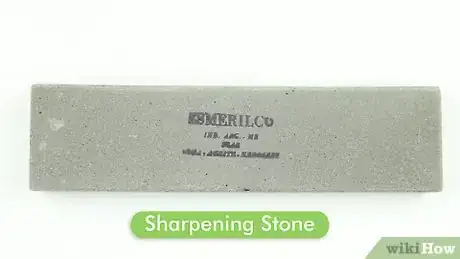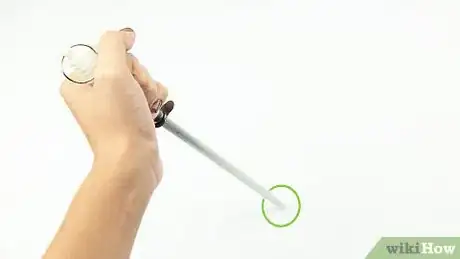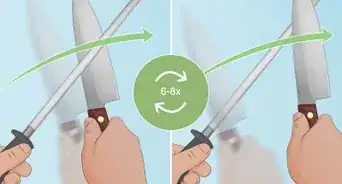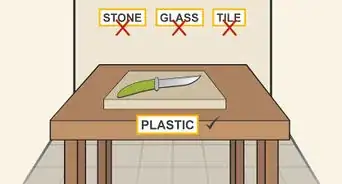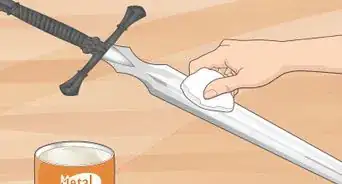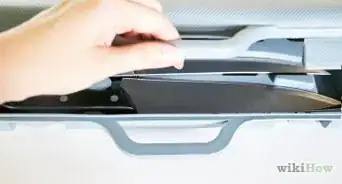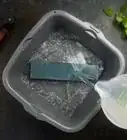This article was co-authored by Ollie George Cigliano. Ollie George Cigliano is a Private Chef, Food Educator, and Owner of Ollie George Cooks, based in Long Beach, California. With over 20 years of experience, she specializes in utilizing fresh, fun ingredients and mixing traditional and innovative cooking techniques. Ollie George holds a BA in Comparative Literature from The University of California, Berkeley, and a Nutrition and Healthy Living Certificate from eCornell University.
wikiHow marks an article as reader-approved once it receives enough positive feedback. In this case, 80% of readers who voted found the article helpful, earning it our reader-approved status.
This article has been viewed 361,444 times.
What good is a knife that is so dull it will not cut anything? Pocket knives are handy, but because of their accessibility, they get used for all sorts of purposes. It is common to see a person use a pocket knife for carving wood, cutting up boxes, opening food packages, even poking at an unidentified bug, and then wiping the blade on his or her pants and putting it back in a pocket. People endure a dull blade senselessly--even though a dull knife takes more force to use. Knives take only a few minutes to sharpen. Try these two methods to sharpen your blade.
Steps
Sharpening Your Knife with a Stone
-
1Choose the style of sharpening stone you wish to use to sharpen your pocket knife. No matter which type of stone you select, keeping to one that is at least 2x6 inches will make your sharpening job easier. There are several commercial options available, including diamond stones, ceramic stones, and whetstones.
- Whetstone: These stones are generally considered the easiest to use and are made from fine to coarse grit stone. You must soak your whetstone in cold, clean water for ten minutes before you sharpen your blade on it. Keep in mind that when a whetstone is used a lot, it often develops valleys or grooves where the knife is rubbed.
- Ceramic Stones: These stones must also be soaked in water before use, but for only three to five minutes. They are harder than whetstones which means that they will sharpen your blade faster. Ceramic stones generally last longer than whetstones but are a bit more challenging to use.
- Diamond stones: These stones come in several different levels of coarseness including hard, fine, and superfine. [1] In many cases, diamond stones are actually metal plates with small diamonds attached to their surfaces. Some of the substrates have holes to capture the swarf, or sharpening debris. These stones are the hardest sharpening stones and will sharpen your blade the quickest. Keep in mind, that diamond stones are also by far the most expensive sharpening stone, but last the longest.
-
2Lubricate your sharpening stone. If you are using a whetstone or ceramic stone, you should soak the stone in the water for the correct amount of time. Knife sharpening experts also recommend using a lubricant such as mineral oil. You can buy this oil at your local hardware store. The purpose of lubricant is to prevent the stone's pores from clogging up with the swarf, filings and grit. It also reduces the heat caused by the friction that is created when the knife is rubbed on the stone. Too much heat can warp your blade.[2]
- Sharpening or machine oil can be used with a whetstone or ceramic stone, and thinned dish washing soap is handy for use with a diamond stone.
Advertisement -
3Identify the bevel angle of the blade. The two most important parts of sharpening a blade are knowing to what angle to sharpen the blade, and to keep that angle as steady as possible during sharpening process. The blade of every knife is honed at a particular angle to suit the purpose of the knife. This is also called the rough grind angle. Most pocket knives have a bevel edge of 25 to 30 degrees.
- If you are wary of sharpening your knife without knowing the exact angle, you can go into your local knife shop for help, or call the manufacturer of the knife. You may also be able to find the specific bevel angle for your knife online.
-
4Position the knife at the proper angle against the stone. Maintain the knife's position with the blade facing away from you at the determined bevel angle against the whetstone when sharpening.
- Keep your hand steady and maintain the angle throughout the entire sharpening stroke. You may end up putting a rounded edge on the blade instead of a sharp edge.
- Holding your knife in the same position for a long period of time can be challenging. If this is your first time sharpening a knife, or you feel like your hands may not stay steady for long enough, you should consider buying a sharpening guide. Sharpening guides attach to the knife and hold it at a steady angle. Keep in mind that guides do not do very well with a curved blade.
-
5Glide the knife along the stone. Sweep the knife down and off the end of the whetstone. Repeat as many times as necessary to produce a sharp edge, usually about 12 times. As you perfect your sharpening skills, this will become a more circular motion of the blade over the stone.
- Blades that are curved or longer than your whetstone will need to be swept down and across the stone to evenly sharpen the entire blade.
-
6Sharpen the other side of the blade. Flip the knife over and draw the blade across and off the whetstone, guaranteeing the desired angle. Do this between 6-8 times or until a sharp edge is achieved.
-
7Flip the stone over so that the finer side is facing up. Run your blade, at its proper bevel angle, along the finer side of the stone. Doing this will remove any bumps or 'burrs' that may have formed along the edge of the blade during the sharpening process.[3]
- Instead of using the finer side of the stone, you can also run each side of the blade down a honing rod at an angle more open than the one you held the blade at to sharpen it. This removes the burrs and fine tunes the blade's sharpness. Honing is also a quick way to refresh an edge in between sharpenings.
-
8Test your pocket knife for sharpness. Hold up a piece of paper, and try to slice down through the paper with your knife. A sharp blade will easily slide through the paper.
- You can also test for any rounded part of the blade or imperfections by holding your knife up to a light (you could also use the sun) and looking for a bright light reflection. Reflections exist only when there is a rounded edge somewhere along your knife, or a section of a knife that is no longer sharp.
Using a Honing Rod
-
1Know that rods are better for 'honing' the edges of knives. Rods are also known as sharpening steel. While rods will, in a sense, sharpen your knives, what they are really doing with a rod is honing the blade--with the same result as sharpening your knife on a stone.[4]
- There are several kinds of rods. The most common is the steel honing rod, which is also known as sharpening steel. It is a very effective and reliable way to sharpen your knife. Rods can also be made out of ceramic and diamond. Both of these materials are reliable because they are two of the hardest materials in existence. Diamond rods are known to create smoother blades, but both will sharpen knives very quickly.
-
2Hold the rod by the handle, so that the rod's tip is on the counter. To be safe, place the tip on an old tea towel on top of your chopping block or cutting board. (So that you don't leave gashes in your counter tops, and dull your knife at the same time!) The rod should be held straight up and down so that it is perfectly vertical.
-
3Find your bevel angle. You must again determine the angle at which you should hold the blade against the rod. Pocket knives should generally be held at a 25 to 30 degree angle.
- Go to your local knife shop or hardware store and ask them to determine the angle of your knife if you don't feel confident that you have the right angle.
-
4Swipe the knife's edge along the rod. You should swipe slowly and use a light touch--do not push the knife against the rod with a lot of pressure. Move the knife from heel to tip as you swipe it down along the rod, maintaining the same angle throughout the stroke.[5]
-
5Switch sides so that you hone both sides of the knife. If your knife is relatively sharp, you should only have to swipe the knife along the rod a couple of times on each side. If your knife is very dull, you will have to swipe the knife several more times.
Community Q&A
-
QuestionDo I need to strop the knife after honing?
 Community AnswerIt's not required, but it will clean up any burs and make your knife sharper.
Community AnswerIt's not required, but it will clean up any burs and make your knife sharper. -
QuestionHow do I know when to sharpen my knife?
 Community AnswerWhen you look at the edge against the light and the sharp edge looks round and shiny.
Community AnswerWhen you look at the edge against the light and the sharp edge looks round and shiny. -
QuestionHow do I sharpen the top of the knife?
 Community AnswerUse a rock that isn't mostly chalk. Slate rock are usually the most effective. Put the knife at an angle pointing away from you body and push down until you get to the point of the knife. Make sure to do this one both sides to ensure a good sharp edge.
Community AnswerUse a rock that isn't mostly chalk. Slate rock are usually the most effective. Put the knife at an angle pointing away from you body and push down until you get to the point of the knife. Make sure to do this one both sides to ensure a good sharp edge.
Warnings
- As you may have guessed, sharpening a knife can be dangerous. Use utmost caution when sharpening your knife, regardless of the method you use.⧼thumbs_response⧽
Things You'll Need
- Whetstone, ceramic stone, or diamond stone
- Lubricating oil
- Piece of paper
- Honing rod
References
- ↑ http://www.oboes.com/oboeglossary.html
- ↑ http://www.artofmanliness.com/2009/03/05/how-to-sharpen-a-pocket-knife/
- ↑ http://www.lovetheoutdoors.com/how-to-sharpen-a-knife-with-a-whetstone/
- ↑ http://www.steamykitchen.com/1709-how-to-sharpen-your-knives.html
- ↑ http://www.steamykitchen.com/1709-how-to-sharpen-your-knives.html
- Videos provided by The Weavers of Eternity Paracord Tutorials
About This Article
All you need to sharpen a pocket knife is a sharpening stone and some lubricant. Apply a lubricant such as mineral oil to the stone to prevent the stone’s pores from clogging up with grit. Glide the knife down and off the stone at the bevel angle approximately 12 times to sharpen it. Repeat the process on the other side of the blade. You can also use a honing rod to sharpen a knife. Hold the honing rod by the handle and position the tip on a countertop or table. Swipe the edge of the knife down the honing rod at the bevel angle until it is sharp. For more information about sharpening a pocket knife, like how to test if the knife is sharp using paper, read on.
